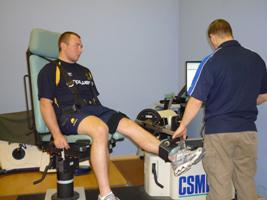Sports therapy and injury rehabilitation
With more people participating in sport and exercise, there is an increasing demand for professional care.
The MPC offers a range of injury rehabilitation services such as 3D Gait Analysis and use of the Isokinetic Dynamometer to assess range of motion around most of the body’s major joints.
Isokinetic Dynamometer

The Isokinetic Dynamometer is a testing and rehabilitation system capable of measuring a range of isolated joint movement patterns in four resistance modes: isotonic, isometric, isokinetic and passive.
Parameters tested include strength, power, fatigue and imbalance. Muscles can be tested both eccentrically and concentrically at speeds ranging from slow (15° per sec) to fast (500° per sec), however the most appropriate test will be selected based on client history and requirements. Joints able to be tested are shoulder, elbow, forearm, wrist, hip, knee and ankle. A printed report displaying the results from the muscle function being tested is provided for clients.
Clinical Gait
Clinical Gait analysis provided at MPC is based on 3D motion capture using a 15 camera system. This process involves the patient walking across force plates within the laboratory, with a number of small reflective markers attached to body landmarks allowing digital reconstruction of the underlying skeletal movement during locomotion. Reports can be produced to show joint movement both in graphic and 3D visual form. It is recommended that clients are referred by a medical professional who will then interpret results and make recommendations for rehabilitation, as we do not have a medical professional on site to provide this service.
Sport and Exercise Therapy and Rehabilitation Clinics
The Sport and Exercise Therapy Injury and Rehabilitation Clinic is run in conjunction with the BSc in Sports Therapy, located on the Sports Centre Balcony in the St Johns Sports Centre. To make an appointment, use the online booking system. For further information, email SportsTherapyClinic@worc.ac.uk.